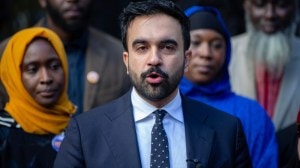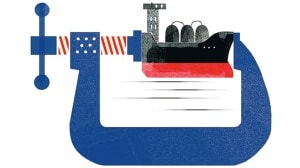Working together, Obama, Bush try to calm volatile market
President-elect Barack Obama sought to seize the reins of the economic crisis as he and his new economic team worked closely with President Bush to inject confidence into the trembling financial markets, which rallied and erased most of last week’s losses.

President-elect Barack Obama sought to seize the reins of the economic crisis on Monday as he and his new economic team worked closely with President Bush to inject confidence into the trembling financial markets, which rallied and erased most of last week’s losses.
The coordination between Obama and Bush was taking place among aides, as well as in direct talks about the rescue plan for Citigroup and unresolved details of the overall Treasury bailout plan. The president said his successor would be informed of every “big decision” that was made, adding, “It’s important for the American people to know that there is close cooperation.”
To calm anxious markets, the Federal Reserve and the Treasury plan to announce a major lending program on Tuesday to jump-start frozen loan markets, administration officials said. The Treasury had signaled earlier this month that it was considering such an action for consumer loans, but the action to be announced will broaden the program to include business debt.
In effect, the program would create a government bank to finance hundreds of billions of dollars in commercial debt, like car loans, student loans and business leases. The Treasury is expected to contribute $10 billion to $20 billion in seed capital, which would come from the $700 billion originally provided to shore up the financial system. The Federal Reserve would lend the new entity as much as 20 times that amount.
For his part, Obama sought to assure Americans and foreign investors that he was seeking to fill any leadership vacuum, and said his economic advisers would begin working “today.” The advisers include Timothy F Geithner, his choice for Treasury secretary.
The Standard & Poor’s 500 stock index rose 6.4 per cent, and the Dow Jones industrials jumped 4.9 per cent, reprising the Friday upswing.
As if to underscore the transfer of power now under way, Obama introduced his new economic team at a news conference here shortly after Bush made brief remarks outside the Treasury Department.
Obama expressed support for the Citigroup plan and urged Congress to adopt swiftly a major plan to stimulate spending and to reverse job losses.
“The news this past week, including this morning’s news about Citigroup,” Obama said, “has made it even more clear that we are facing an economic crisis of historic proportions. If we do not act swiftly and boldly, most experts now believe that we could lose millions of jobs next year.”
Democratic leaders in Congress are gearing up to move quickly on an economic recovery package that aides said could cost more than $500 billion. The goal is to have a legislative package approved by the House and the Senate and ready for Obama to sign, perhaps on his first day in office, in January.
“We have to make sure,” Obama said, “that the stimulus is significant enough that it really gives a jolt to the economy.” The president-elect declined to estimate the size or scope of such legislation, but he said, “we are going to do what’s required.”
The selections of Geithner, who played a large role in the Citigroup rescue plan as president of the Federal Reserve Bank in New York, and Lawrence H. Summers, now a Harvard economist, signaled that Obama intended to pursue aggressive, yet centrist policies, in finding ways to help jump-start the economy.
Over the next four weeks, Obama intends to announce most of his cabinet. While he has already settled on most of the key members, including Governor Bill Richardson of New Mexico as commerce secretary, the president-elect made certain that his first formal cabinet selections dealt with the economy rather than national security, which more often is given first mention.
Obama also announced on Monday that he had chosen Christina D Romer to head his Council of Economic Advisers and Melody Barnes as director of his White House Domestic Policy Council. Romer is an economics professor at the University of California, Berkeley; Barnes is a longtime aide to Senator Edward M Kennedy, Democrat of Massachusetts.


- 01
- 02
- 03
- 04
- 05





























